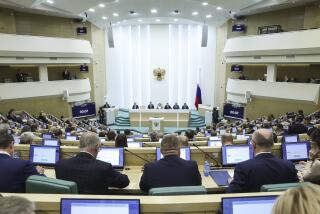Be Serious
- Share via
Soviet leader Mikhail S. Gorbachev’s call for a quick, one-issue summit meeting to discuss an end to nuclear testing was a grandstand play. The framework for a follow-up summit meeting, to be held in the United States, was established when President Reagan and Gorbachev met at Geneva in November. All that’s required is agreement on the date. The Soviet leader could not seriously have expected his proposal for a test-ban summit in Europe, made in a weekend television broadcast, to be accepted. Perhaps he was laying the groundwork for a resumption of Soviet nuclear testing after a months-long unilateral moratorium.
Secretary of State George P. Shultz is on the mark with his plea for both sides to move away from public posturing and return to the quiet diplomacy that historically has produced the best results in U.S.-Soviet relations.
Having said all that, it must be recognized that the Administration has not treated the whole nuclear-test-ban issue with the seriousness that it deserves.
The official U.S. view is that a nuclear-testing moratorium is unacceptable in the absence of an overall agreement on nuclear-arms limitation, including agreement on acceptable verification measures. The Administration’s efforts have not gone much beyond seeking to engage the Soviets in negotiations on the verification issue.
Negotiating a permanent, comprehensive, preferably total test ban would be difficult. At any given time a testing cutoff is inconvenient to one side or the other because of the pressure to test new weapons. And, fundamentally, neither Moscow nor Washington would be interested in a permanent test ban that does not include the French, British and Chinese.
The fact remains that a nuclear-test ban is a potentially promising approach to controlling the competition in nuclear arms. Without nuclear tests, countries with nuclear weapons could not be sure that they would work; the existence of that doubt on all sides would inhibit any rational leader from using nuclear weapons.
There is growing agreement within the scientific community that means now exist to detect nuclear explosions down to a very low level. Critics suspect that the main source of the Administration’s reluctance to accept a test ban is related to the President’s Strategic Defense Initiative. That is puzzling, if true, because Reagan has repeatedly said that his “Star Wars” program is aimed at developing non-nuclear means of destroying offensive missiles.
The Administration’s negative reaction to Gorbachev’s Madison Avenue approach to negotiations is appropriate. But the time is overdue for the U.S. government to move beyond lip service to substantive efforts to negotiate an eyes-wide-open test-ban treaty that would slow the nuclear-arms race while providing genuine safeguards against Soviet cheating.
More to Read
Sign up for Essential California
The most important California stories and recommendations in your inbox every morning.
You may occasionally receive promotional content from the Los Angeles Times.













